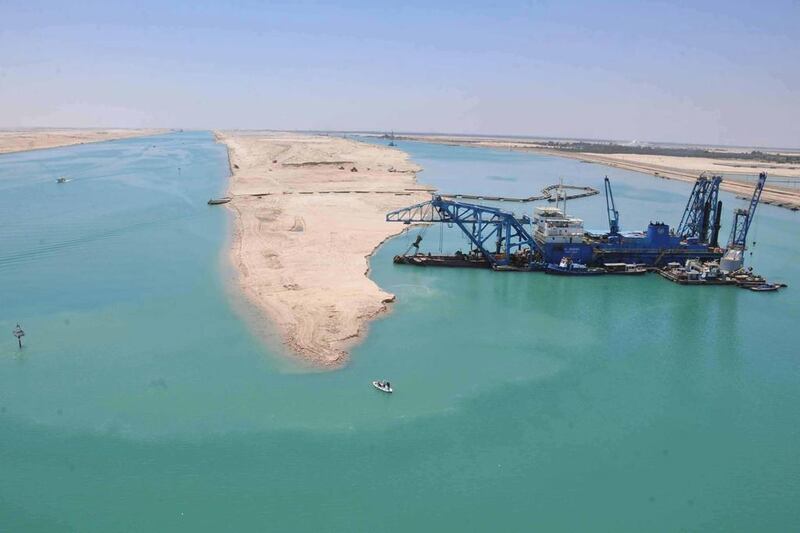UAE investment in Egypt – boosted by the New Suez Canal that formally opens today in Ismailia – will produce substantial financial returns, as well as political benefits, according to banking and legal business experts.
New figures from HSBC show that about US$70 billion of funds have been firmly agreed or proposed under deals between Egyptian and Emirati entities since the key economic conference at Sharm El Sheikh in March, but the bank believes the final investment total could be much higher.
Ahmed Abdelaal, HSBC’s regional head of corporate banking and structured finance, said some indications place the total of GCC investment in Egypt over the next five years to be as much as $150bn.
“The first step was to complete the new canal extension, and that has been done. Now the momentum switches to the special zones near the canal. We are working with several investors from the UAE on new deals there,” he said.
“We believe this is a good financial investment. The kind of companies that have been involved on the dredging work – Dutch and Belgian investors as well as Emirati – are in it for financial, not political, reasons. The reason it got built in 12 months was the availability of funding and the terms of payment, sound financial reasons.”
That was echoed by one of the top corporate lawyers working on UAE investment in Egypt.
“It is very exciting, especially phase two of the Suez project, the new special economic zones,” said Marwan Elaraby, the US law firm Shearson & Sterling’s managing partner for the Middle East.
“Investors will go for the value-added services these areas will provide. Egypt is learning from the UAE that free zones are good for the overall economy.”
He said the most attractive sector for partnership between Egypt and the UAE could be energy. “Egypt is reliant on traditional energy forms, mainly oil and gas. The UAE, with the alternative energy expertise of firms like Mubadala, Masdar, Ipic and Al Noweis, can help Egypt diversify away from this.”
Mr Elaraby said there were other areas in which the UAE could help Egypt. “Investors want access to opportunities without the red tape traditionally associated with the country. The UAE has proved itself good at this,” he said.
At the sharp end of global trade, DP World, a UAE-based global leader in the ports business, said the new canal would benefit its existing facilities in Egypt and in the Middle East, where it runs the biggest port at Jebel Ali in Dubai.
“The new canal is important not only for Egypt, but also for the development of East-West trade, as reduced waiting time in the canal will allow liners to deliver goods faster than before,” said the company.
“The authorities expect the number of vessels going through the canal to almost double by 2023,” the company added.
DP World said that could only be beneficial for business at Jebel Ali and would boost overall trade in the region.
“This positive impact on trade will encourage port infrastructure development in the Middle East and East Africa to meet growing demand,” it said. “At the same time, DP World Sokhna [at the southern end of the canal] will provide an ideal port of call for liners making northbound trips from Asia, China, the Middle East and the subcontinent, and on their return journeys from Europe.”
Mr Abdelaal said he believed bilateral relations would move to “the next level” as a result of the investment partnership.
“Historically, there has been a good relationship and Egypt is regarded as a core investment market for the UAE. Political ties help facilitate that relationship, and helps create a better investment environment,” he said.
Mr Elaraby said the new business relationship between the UAE and Egypt would encourage further investment in Egypt’s stock market, which has a joint agreement with Nasdaq Dubai.
“The Cairo market effectively shut down for new issuance for the past three years or so, but now we’ve seen four IPOs recently, and we advised on three of them, which were more than 10 times oversubscribed. It is not just Egyptian retail investors, but global institutions, who are interested in Egypt again.”
Regarding security concerns, especially in the Sinai Peninsula bordered by the new canal, Mr Abdelaal said: “Security in that region has been neglected for years, with the consequent deterioration we’ve seen. But that has changed over the past few months.
“The authorities have cleared up the area and imposed the rule of law. The new economic developments will bring jobs, stability and security to the region, which is now a key focus for the Egyptian government.”
fkane@thenational.ae
Follow The National's Business section on Twitter





